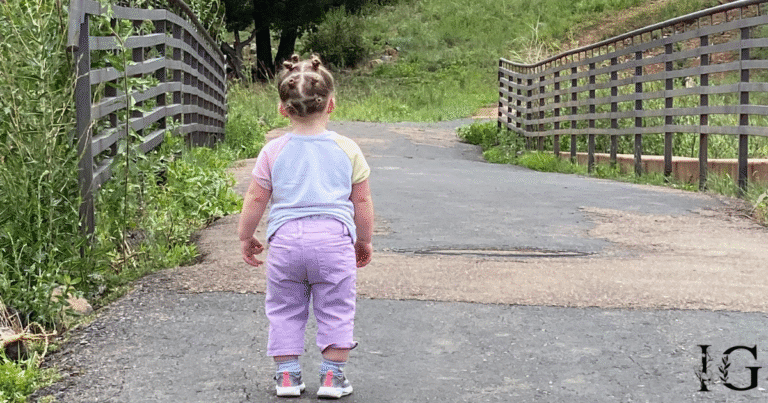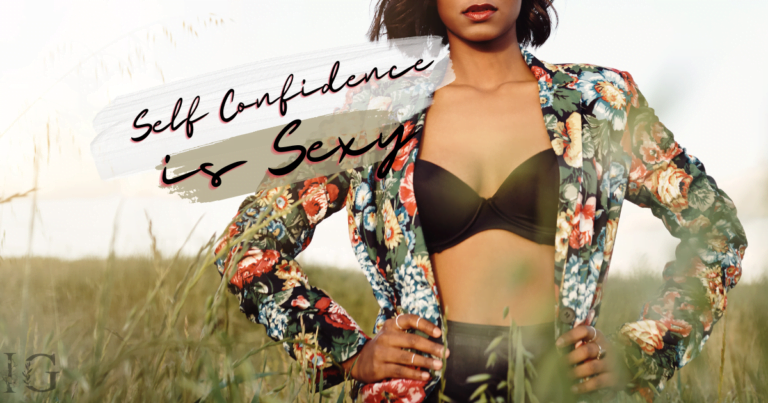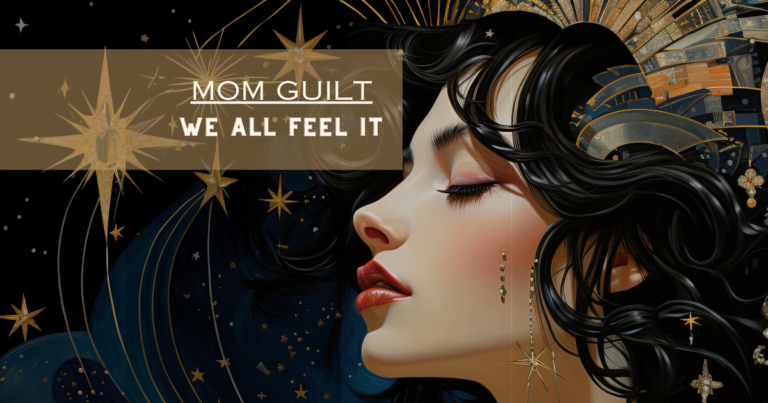Ever heard of Resting Bitch Face (RBF)?
I’m sure you have in one way or another. But are you, like me, one who totally has one?
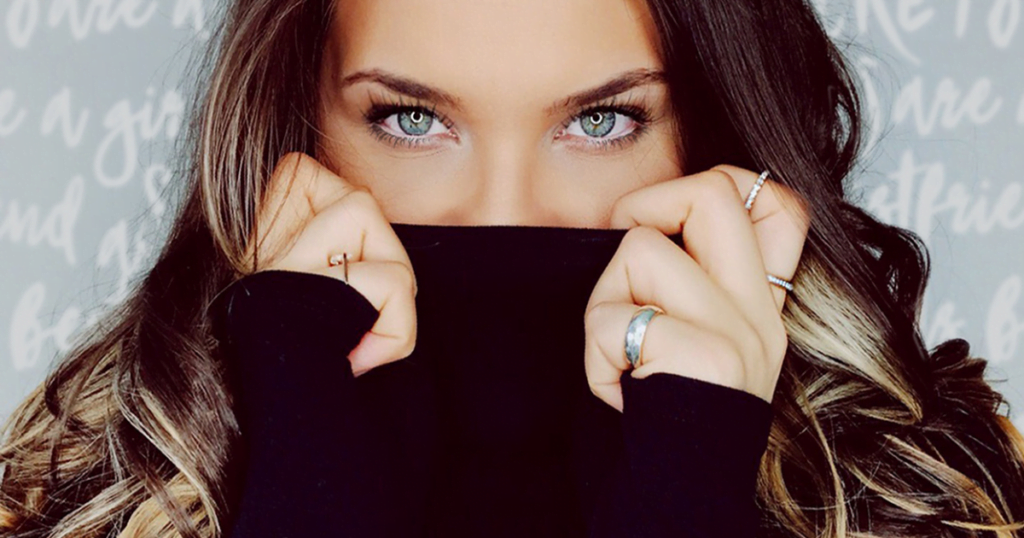
“RBF” has seemingly become a phenomenon in our culture. There’s countless memes, articles, and discussions across social media platforms.
While the term itself may sound and be used in a lighthearted way, its implications can touch on deeper issues such as those related to facial expressions, gender, self-esteem, and perception.
A Resting Bitch Face definition, according to dictionary.com:
Resting Bitch Face
noun (informal)
(Typically with reference to a woman) a sullen or scowling expression attributed to or unconsciously adopted by a person when in repose.
Or according to dictionary.Cambridge.org:
A Resting Bitch Face is an “unkind, annoyed, or serious expression that someone has on their face when relaxed, without intending to.”
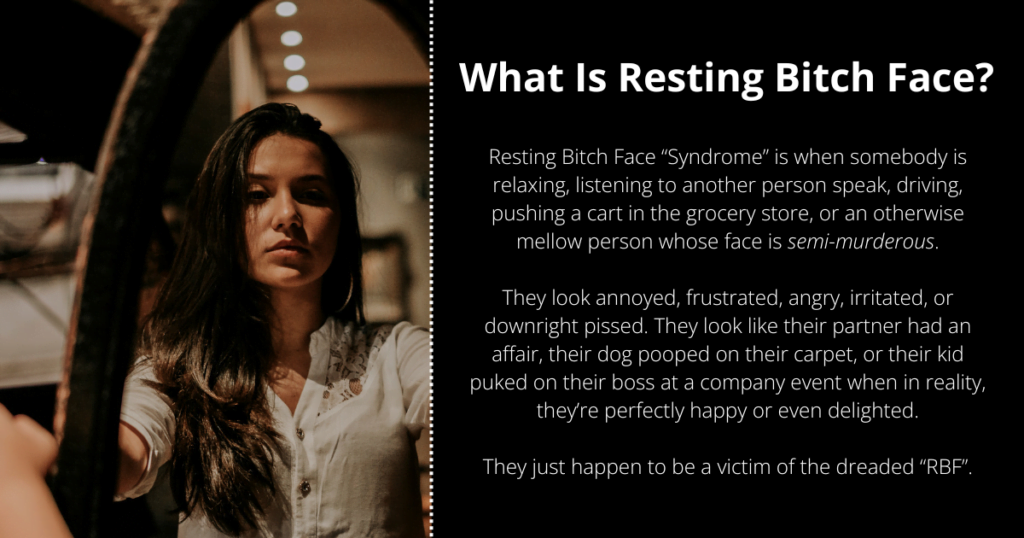
Though typically used in a joking or lighthearted manner, for me, this term has never been a compliment. In fact, being told I have “quite the RBF” has been more insulting than anything and has actually been a blow to my self-esteem and confidence over the years.
I don’t feel like anyone would agree that it’s a great feeling to be “labeled”.
Going Way Back – Discovering I Have An “RBF”
I remember being told as a kid that I needed to “slap a smile on my face” and was consistently asked “why are you so mad?”
Huh?
I wasn’t!
At least, I didn’t think so…
Wait, Was I?

Man, it really messed with my head.
I was even given a shirt one time that said “I’m not mad, just Leave. Me. Alone!” because that really became a regular quote for me.
Sometimes I wish I could go back and give myself a hug.
This continued into high school and beyond. I have so many memories of feeling fine as can be when suddenly I’d have someone take a literal step back like “woah!” And when I looked at them, they’d say something along the lines of: “what did I do to you? Are you mad??”
Ugh! No!
Honestly, as much as it affected me each time it happened, it didn’t really HIT me until, fast forward to years later when I felt like I finally may have gotten a hang of “holding my face a certain way” (think, eyebrows casually up at all times) when a good friend of my husbands, (who I genuinely liked and thought I finally established a good relationship with) asked him in private “does Grace hate me?”
Whaaaatttt??
Now, I’m not exactly sure what it was about this particular instance vs all the rest that really got to me, but holy moly! It really broke me. I went into a whole cycle of “why try? No one likes me anyway…*insert negative thoughts continuously here*”
See, I’ve always been pretty shy. I can honestly say it takes a LOT of effort on my part to meet someone new, let alone try to form a new and genuine relationship.
I’m someone who craves genuine friendships and social interactions. I call myself an extroverted introvert.
Or is it, Introverted extrovert?

I think you may get the idea.
Hearing this constant theme over the years really took a hit.
So, if you’re like me and have had this so-called “syndrome” affect your self-esteem, and maybe you’re also on the path of self-improvement, whether that be changing your mindset for the better or otherwise, I want to give this concept of the dreaded RBF a thorough exploration.
I’m going to delve into the believed origins of Resting Bitch Face, lightly examine its social ramifications, and finally, propose some tips or solutions that have actually helped me in navigating and understanding this intricate “situation”.
The Origins of Resting Bitch Face.
The term “Resting Bitch Face” gained more of a widespread recognition in the early 2010s, from what I found, mostly through internet memes and viral content. I can say it was around before them because It was long before the 2010s that it impacted me personally, but let’s continue…
It refers to a facial expression that appears unapproachable, indifferent, or even hostile (hi, did someone say Grace?) particularly when the individual is not actively engaged in conversation or displaying obvious emotions. AKA a blank face.
But where does RBF come from? Is it a conscious choice, an involuntary expression (I could swear this was it), or, is it a mix of both?
Research suggests that facial expressions, including RBF, are influenced by a combination of genetics, environment, and social conditioning.
Greeeat.
The Science Behind Resting Bitch Face
Facial expressions are obviously a fundamental aspect of human communication. Our faces convey a wide range of emotions as well as social signals.
There’s been research in psychology and neuroscience that has apparently shed light on the underlying mechanisms of facial expressions, including their role in social interactions and emotional regulation.
We all may know that certain facial muscles are activated when we feel more intense emotions, such as happiness, sadness, anger, and surprise.
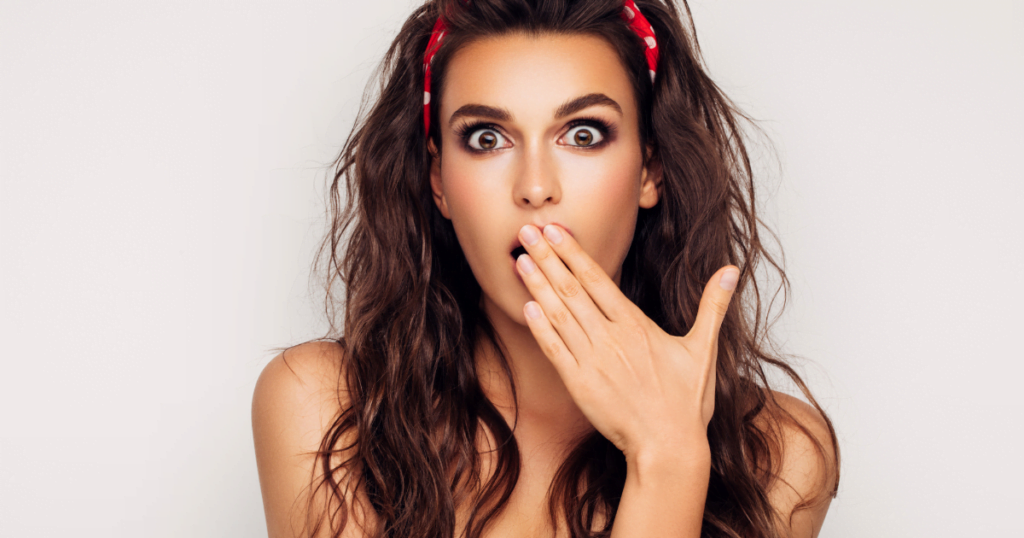
SURPRISE!
But when we’re resting our faces, and no particular emotion is being felt to directly impact our expression – well, that can vary widely person to person.
Resting Bitch Face appears to be set apart by subtle cues such as:
• a slight furrowing of the brow
• a tightened jawline
• or a neutral mouth expression that may be interpreted as conveying negative emotions or disinterest (turn that frown upside down! 😉 )
These cues can be affected by factors such as genetics, the way your face is structured, and habitual facial expressions.
Gender and Resting Bitch Face
One of the most interesting aspects of Resting Bitch Face is it’s typically associated more with women.
Rude.
While both men and women can exhibit RBF, obviously, it’s associated more strongly with women, which can lead to a lot of bias and even *gasp* stereotyping.
As women, it seems our faces are more scrutinized and even criticized for the expressions we bestow upon the world. At least in regards to being labeled in the way I’m discussing.
RBF is being interpreted as evidence of unfriendliness, arrogance, or bitchiness.
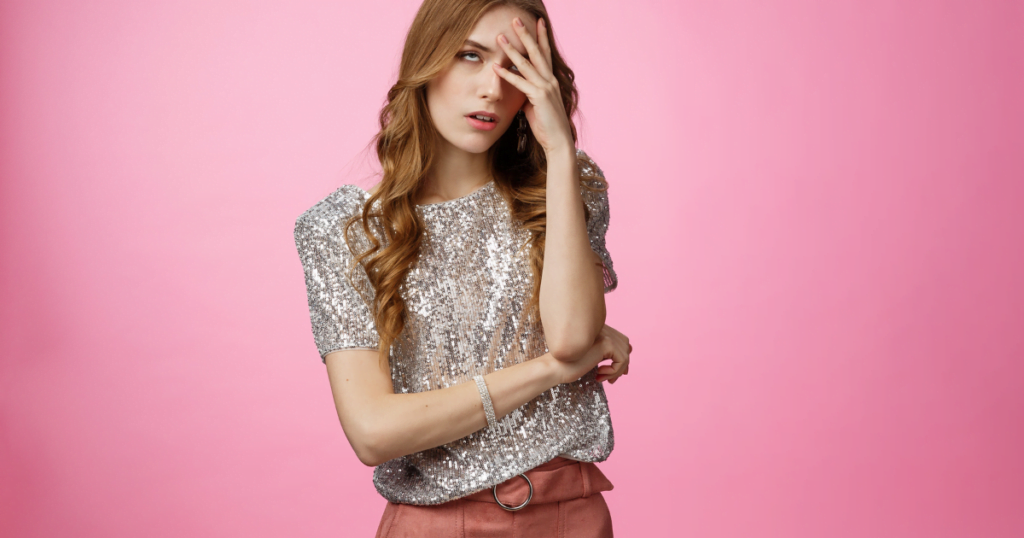
It can definitely be seen as a double standard.
Moreover, the term “bitch” itself carries gendered and derogatory meanings. This further complicates discussions around RBF and perpetuates negative stereotypes about women’s assertiveness.
I know I’ve unintentionally felt like a so-called “bitch” when I am more direct. It seems my face, especially when I’m triggered in any certain way, can really get people’s attention! Ha ha… oh, I have so many stories!
😬😬😬
Social Results of The Resting Bitch Face
I’ve found that this perception of Resting Bitch Face can have consequences in various social and professional contexts. I know it affected me many times in my various jobs.
People with RBF may find themselves:
• judged more harshly
• overlooked for opportunities
• subjected to unfair treatment based on assumptions about their personality or intentions.
In the workplace, for example, RBF may be misconstrued as a lack of enthusiasm or confidence. I know this was the case for me.
Also true for me is the struggle within social settings to make connections and feeling misunderstood by others. This has led to feelings of isolation or self-consciousness.
So what are ways we can turn this negative into something better?
Navigating Resting Bitch Face: Some Coping Strategies and Tips To Feeling More Empowered.
It’s just my face!
Despite the challenges posed by having a Resting Bitch Face, I’ve found there are some strategies you can implement that can improve the way this issue can affect you mentally.
These strategies are:
- Self-Awareness and Mindfulness: By recognizing how facial expressions and body language come across as a whole can really help you become more mindful of how they are perceived by others. As true as it is to say it’s technically not our fault that our face looks a certain way when resting, it’s also not technically the fault of the other person who tends to get “spooked” by what they perceive our face to be portraying,
- Practicing self-awareness techniques, such as mindfulness meditation or journaling. This has helped me encourage a calmer emotion in regards to how I feel around others. I used this as a way for how I make my resting bitch face on point! 😉
I’m learning not to let things such as being labeled or misunderstood get to me so deeply. I know I can’t change my face but I can improve how I might hold it by having a greater sense of mindfulness over how I’m feeling in any particular moment.
- Assertiveness Training: Learning assertiveness skills can be an empowering tool for people to communicate their needs and boundaries better, regardless of the expression on their face.
I’m finding that Assertiveness training can help in developing better confidence, self-esteem, and interpersonal skills, which has enabled me to navigate social and potentially even professional situations just a little bit easier.
- Challenging The Thoughts On Women Being The Only Ones Capable Of Having RBF: Address the idea that this term is typically used only towards women. The truth is it can happen to ANYONE!
I don’t feel I need to delve too deeply into this one, but I’ve found that by recognizing that it’s not JUST because I’m a woman, well, that definitely makes me feel a little better. LOL.
Conclusion
Resting Bitch Face is more than just a funny meme; it can reflect a broader issue in many areas of someone’s life.
By raising a bit of awareness to the subject could help people to realize that maybe it shouldn’t be thrown around so casually.
You never know what someone is really feeling so I’d caution not to use the term to describe someone’s appearance by default.
On the other hand, I am surprisingly grateful to have been made aware (maybe not in so many ways and scenarios) that this is how I may come across because I do believe that being aware of how you’re perceived can be a powerful tool to help on anyone’s journey of self-improvement.
In the end, it’s up to the person wielding the RBF whether or not to “own it” and better yet “love it” or decide it’s something they truly wish to improve.
Either way, I’m learning that it’s important to first learn to love yourself AS YOU ARE NOW, then by all means, focus on other things that make you feel even better.
I’m finding that it really feels good to be valued for who I am, and not just how I appear.
The most important person who can value me for who I am? Well, that’d be me.
When I find value in myself, it’s so much easier to find value in others too. This is a great little tip to keep in mind when cultivating relationships.
Related: Boost Your Self-Worth | 18 Tips For Self-Improvement & Positive Growth
So, have you been impacted by the RBF? Let me know in the comments below!

